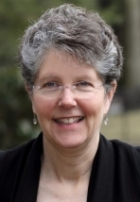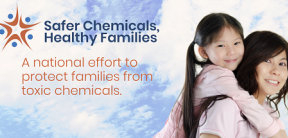You are here
How a Small Foundation Catalyzed Big Changes for Better Environmental Health

This article by Carolyn Fine Friedman, chair of the Fine Fund and HEFN steering committee member, was originally posted to Exponent Philanthropy’s blog on Sept. 18, 2018. Exponent Philanthropy is the country’s largest association of funders, dedicated to serving foundations with few or no staff, philanthropic families, and individual donors.
I am a funder of environmental health issues, but I also have a personal stake. In 2006, I had my blood tested for toxic chemicals. Despite my best efforts to avoid chemicals in what I eat, where I live, and the products I use, the blood test found that I carry a body burden that includes lead, mercury, and phthalates—chemicals that can cause cancer, birth defects, thyroid problems, and more. It’s hard not to wonder if those results explain some of the symptoms that have plagued me over the years. But I also know that the burden I shoulder is much less than that of low-income families and people of color who are disproportionately impacted by the toxic exposures in their neighborhoods, on the job, and in their homes and schools.
That is why I have been so inspired by the changes I’ve seen in the retail industry recently, brought about by a combination of grass roots advocacy, in-depth expertise, and companies who seem genuinely interested in doing better. Last year I had a ringside seat, through some of my grantees, as a multi-year effort by the Mind the Store campaign and the Healthy Building Network resulted in The Home Depot becoming the first building products retailer to eliminate twelve toxic chemicals from four product categories. These included some of the very chemicals found in my own bloodstream.
The Beginning of My Learning Curve
Once I started really paying attention to the issue of environmental toxins, I began seeing and hearing about it everywhere. There were early stories about toxins in the news, and my concern drove me to have coffee with anyone who knew anything about the issue. That led to invitations to events and to the beginning of my steep learning curve. About ten years ago I attended my first retreat hosted by the Health and Environmental Funders Network (HEFN)—a funder affinity group for environmental health and justice issues—that turned into a jumping-off point to deepen my understanding. It was a relief and energizing to find myself in a room of people who cared about the issue and were doing something about it!
My goal is for the Fine Fund’s small catalytic grants to help fuel a movement toward greater health and the well-being of all of us. My grantmaking approach has always been about my quest for learning and engaging directly with respected experts in the field. Each of my grants represents an important relationship. One of the first catalytic grants I gave years ago was to a university professor who did research on environmental toxins and health, after I was introduced through a colleague familiar with her work.
I learned about The Mind the Store Campaign through my network of nonprofit leaders. This campaign made sense to me because I have seen that greater and faster change is possible in the marketplace than by changing government policy. The Mind the Store campaign has taken many different approaches and strategies to trying to diminish the amount of toxins in the environment, including engaging with several big box retailers such as Walmart, Target, and Staples to secure corporate policies to get harmful chemicals out of the products they sell. For the last seven years I have funded multiple threads of the Campaign, building respect for and trusted relationships with leaders including Bill Walsh at the Healthy Building Network; Andy Igrejas, founder of Safer Chemicals, Healthy Families who also developed the Mind the Store Campaign; and Mike Schade, Mind the Store Campaign Director of Safer Chemicals, Healthy Families.
At a more grassroots level, I have funded an important interlinked effort, The Campaign for Healthier Solutions. This campaign is led by environmental justice leaders representing over 100 diverse environmental justice, medical, public health, community, women’s, and other organizations. They are challenging discount retailers such as the “dollar stores” (Family Dollar, Dollar Tree, and Dollar General) to follow Walmart, Target, Staples and others in adopting corporate policies that will remove harmful chemicals from the products they sell.
Philanthropy Helps Small, Scrappy Groups Get the Attention of Large Corporations
I’ve seen how philanthropy can fuel the power of organizing and information as my grantees work toward common goals. The Campaign for Healthier Solutions and Mind the Store each bring people-power from a diverse array of small, scrappy, and effective groups; and they coordinate and collaborate in ways that are getting the attention of, and results from our nation’s largest corporations. These efforts are supported by technical expertise of groups like the Healthy Building Network. HBN’s unmatched research on chemical hazards in building materials is relied upon by companies like Google to build the healthiest possible campuses for its engineering teams; it’s helping bring these products to the mainstream and to the most impacted communities, faster.
Despite this impressive progress, I still see news stories showing that the problem of environmental toxins hasn’t gone away, energizing me to continue the work of the Fine Fund. As a small funder, I realize I am in an incredible position to help people as a layperson who has found a way to make a difference.
If my story has helped you notice a whisper in your ear and you are interested in learning more about how you can make the environment safer and healthier, I welcome the opportunity to speak with you and help you turn your own work into a roar.
The topic of small funders addressing health, environment, and equity will be explored during Exponent Philanthropy’s 2018 National Conference at the HEFN-led session “Making the Case for Equity-Advancing Grantmaking” at 1:15 p.m. on Friday, Sept. 28.
Carolyn is chair of the Fine Fund, a HEFN steering committee member, and a member of Rachel’s Network. She also serves on the board of Coming Clean and is a past board member of the Northeast Wilderness Trust. Carolyn earned her Ed. M from the Harvard Graduate School of Education.
The Fine Fund is a small trustee-run foundation with two very part-time staff, created in 1997 to support organizations using complementary strategies to eliminate toxic chemicals from humans and the ecosystem.
From our Blog
Upcoming Events
|
Jul 16 2024 Zoom |
Jul 18 2024 Zoom |


